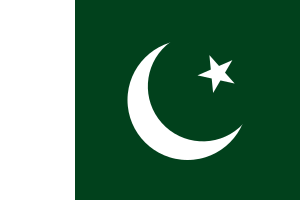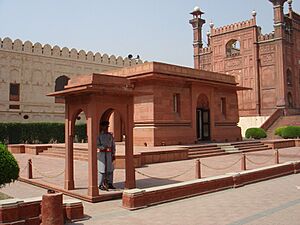Pakistani nationalism facts for kids
Pakistani nationalism is about the strong feelings of pride and love that people in Pakistan have for their country. It includes their pride in the History of Pakistan, Culture of Pakistan, and their shared identity. This feeling helps shape what people hope for Pakistan's future.
This sense of nationalism is largely built on a common heritage shared by most people in Pakistan. Groups like Kashmiris, Sindhis, Balochis, Punjabis, and Pashtuns share many cultural and historical ties. It also involves the important role of religious beliefs that have helped form Pakistan's national identity. This idea of nationalism was a big reason behind the Pakistan Movement, which led to Pakistan becoming an independent country. It still plays a major part in the Politics of Pakistan today.
Before Pakistan became independent, the ideas and actions of the Muslim League were based on a special kind of Pakistani nationalist thinking. This thinking combined ideas about philosophy, national pride, culture, and religion in a unique way.
What is Pakistani Nationalism?
Pakistani nationalism is a feeling of loyalty and love for Pakistan. It means being proud of the country's past, its traditions, and its people. This feeling helps unite people from different backgrounds across Pakistan.
Roots of Pakistani Nationalism
The idea of Pakistani nationalism grew from several important influences. One major influence was the shared culture and history of the people living in the region. Many groups, like the Punjabis, Sindhis, and Pashtuns, have similar roots.
Another key part was the shared religious identity of Muslims in British India. Many felt they needed their own separate homeland. This idea helped bring people together to work for an independent Pakistan.
Key People in the Movement
Several important leaders helped shape Pakistani nationalism and the creation of Pakistan.
Muhammad Ali Jinnah: The Great Leader
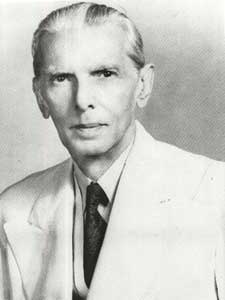
Muhammad Ali Jinnah is known as the founder of Pakistan. People in Pakistan call him "Quaid-e-Azam," which means "The Great Leader." He led the movement for Pakistan's independence. Jinnah believed that Muslims in British India needed their own country to protect their rights and way of life. His strong leadership helped create Pakistan in 1947.
Muhammad Iqbal: The Poet's Vision

Muhammad Iqbal is Pakistan's national poet. He is often called the "Spiritual Father of Pakistan." Iqbal was one of the first to suggest the idea of a separate homeland for Muslims in South Asia. His poems and writings inspired many people to dream of an independent Muslim state. He laid the early groundwork for Pakistani nationalism.
Sir Syed Ahmed Khan: Education and Identity
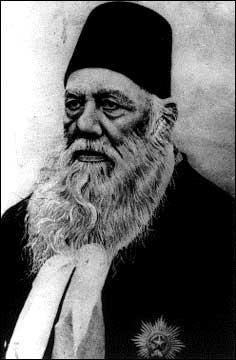
Sir Syed Ahmed Khan was an important Muslim reformer and educator in the 19th century. He worked to improve education for Muslims in British India. He also helped Muslims understand their unique identity and rights. His efforts helped create a stronger sense of Muslim community, which later contributed to the idea of a separate nation.
The Pakistan Movement
The Pakistan Movement was a political effort to create an independent Muslim state. This movement gained strength in the early 20th century. The All-India Muslim League was the main political party leading this effort. They argued that Muslims and Hindus were two separate nations. They believed Muslims needed their own country where they could live freely and practice their religion. This movement led to the creation of Pakistan on August 14, 1947.
Symbols of Pakistani Nationalism
Many symbols represent Pakistani nationalism and pride.
The Flag of Pakistan
The
The national flag of Pakistan is a strong symbol of the country's identity. It has a dark green field with a white vertical stripe on the hoist side. The green represents the Muslim majority, and the white stripe represents religious minorities. A white crescent moon and a five-pointed star are in the center of the green field. The crescent moon symbolizes progress, and the star represents light and knowledge.
National Monuments
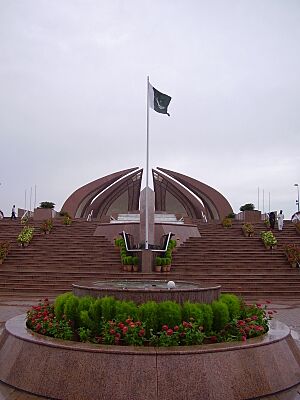
The National Monument in Islamabad is a famous symbol of Pakistan. It represents the unity of the Pakistani people. Its design is inspired by traditional Mughal architecture. The monument reminds people of the sacrifices made to create Pakistan.
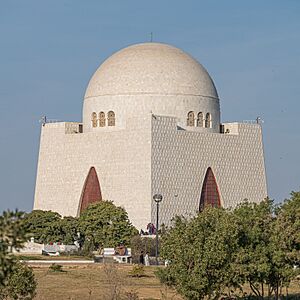
The Mausoleum of M.A Jinnah in Karachi is another important national symbol. It is a place where many Pakistani nationalists visit to pay their respects to the founder of the nation.
The Mausoleum of Iqbal in Lahore is also a significant site. It honors the national poet who envisioned Pakistan.
Images for kids
-
Monument of a nuclear test site placed in Islamabad.
See also
 In Spanish: Nacionalismo pakistaní para niños
In Spanish: Nacionalismo pakistaní para niños
 | Sharif Bey |
 | Hale Woodruff |
 | Richmond Barthé |
 | Purvis Young |


